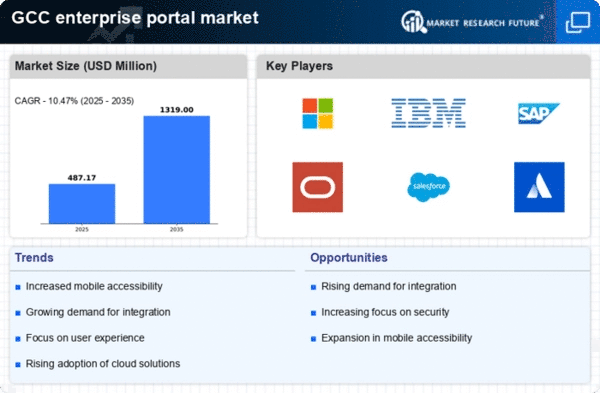Increased Focus on Data Security
As organizations in the GCC become more reliant on digital solutions, the enterprise portal market is witnessing a heightened emphasis on data security. With the rise in cyber threats, businesses are prioritizing secure access to sensitive information through enterprise portals. This focus on security is reflected in the growing investments in cybersecurity measures, which are expected to reach $10 billion by 2026 in the region. The enterprise portal market is adapting to these needs by offering enhanced security features, such as multi-factor authentication and encryption, ensuring that organizations can protect their data while leveraging the benefits of digital transformation.
Growing Adoption of Mobile Solutions
The enterprise portal market is significantly influenced by the increasing adoption of mobile solutions within organizations in the GCC. As the workforce becomes more mobile and remote work becomes commonplace, there is a pressing need for enterprise portals that are accessible on various devices. This trend is supported by data indicating that mobile device usage in the workplace is expected to exceed 70% by 2025. Consequently, the enterprise portal market is evolving to provide mobile-friendly interfaces and functionalities, enabling employees to access critical information and collaborate effectively, regardless of their location.
Regulatory Compliance and Governance
The enterprise portal market is also being shaped by the need for regulatory compliance and governance in the GCC. As businesses face increasing scrutiny regarding data management and privacy, there is a growing demand for enterprise portals that facilitate compliance with local and international regulations. This is particularly relevant in sectors such as finance and healthcare, where strict guidelines govern data handling. The enterprise portal market is adapting to these requirements by incorporating features that support compliance tracking and reporting, thereby enabling organizations to mitigate risks associated with non-compliance.
Rising Demand for Digital Transformation
The enterprise portal market is experiencing a notable surge in demand driven by the ongoing digital transformation initiatives across various sectors in the GCC. Organizations are increasingly recognizing the need to streamline operations and enhance collaboration through digital platforms. This shift is evidenced by a projected growth rate of approximately 15% annually in the enterprise portal market, as businesses seek to integrate advanced functionalities that facilitate real-time communication and data sharing. The enterprise portal market is thus positioned to benefit from this trend, as companies invest in solutions that not only improve efficiency but also foster innovation and agility in their operations.
Emphasis on Customization and Flexibility
Customization and flexibility are emerging as key drivers in the enterprise portal market, particularly in the GCC. Organizations are increasingly seeking tailored solutions that align with their specific operational needs and business objectives. This demand for customization is reflected in the market, where providers are offering modular solutions that can be adapted to various industries. The enterprise portal market is responding by developing platforms that allow for easy integration with existing systems and workflows, thereby enhancing user satisfaction and operational efficiency. This trend suggests a shift towards more personalized digital experiences for users.
















